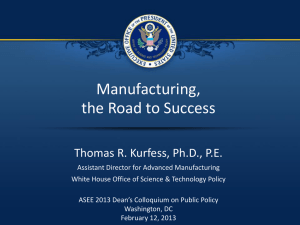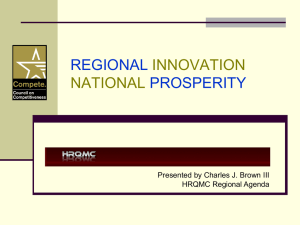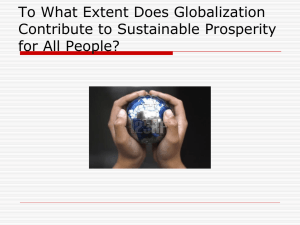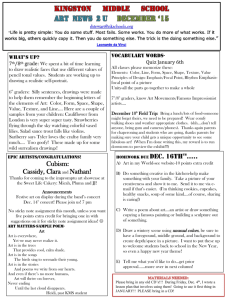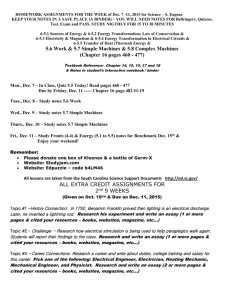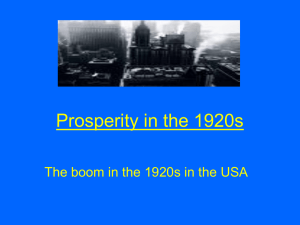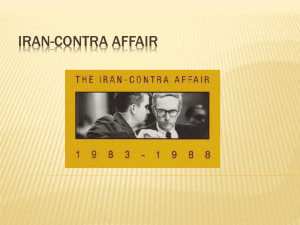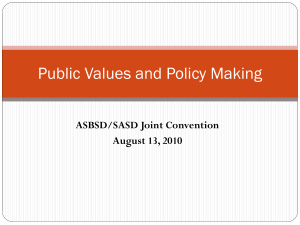Kevin-Wei-DC-version - Debate Central
advertisement
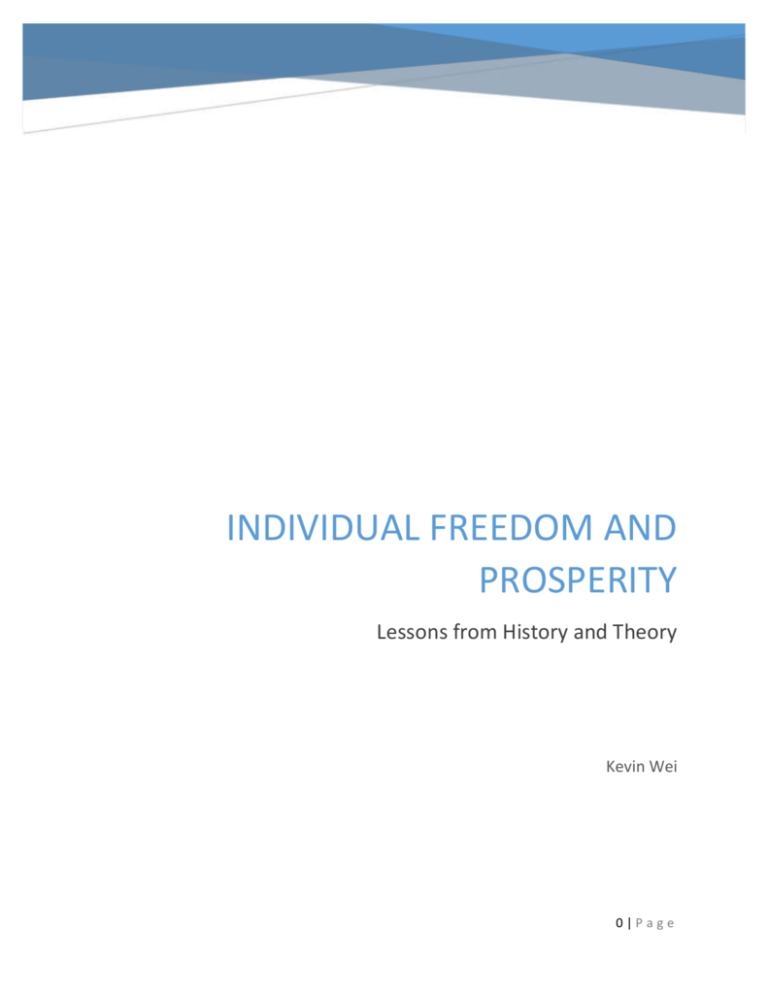
INDIVIDUAL FREEDOM AND PROSPERITY Lessons from History and Theory Kevin Wei 0|Page Since its inception, the United States has experienced astounding advances in terms of individual freedom. Yet if the founders of America had the opportunity to gaze upon America today, it would seem suspiciously similar to the colonies under King George III, because the “long train of abuses and usurpations” (Jefferson) instituted by that monarch and decried by the Declaration of Independence have revived themselves under the rule of President Obama. Whether through attempts to curtail the right to due process through drone strikes on American citizens or the right to property through EPA regulations, Obama’s policies dramatically reduced political and social freedom in the U.S. Worse, economic freedoms are also endangered: the first three years of Obama’s reign saw four times the number of major economic regulations enacted as compared to Bush’s (Katz and Gattuoso). As a result of the administration’s oppressive expansion, the first five years under Obama witnessed the worst economic conditions since the Second World War (Miller). To any student of history or economics, this should come as no surprise. After all, individual civil and economic freedoms are indispensable prerequisites to social and economic prosperity. American history itself is cluttered with examples and counterexamples that demonstrate this very fact. In the tradition the political philosophy of the founders, classical liberalism, all individuals possess fundamental inalienable, compossible rights that imply obligations upon them not to obstruct others’ rights (Goodman). Freedom, then, is the ability to exercise these rights without external interference, whether they be political rights such as those enshrined in the Constitution, or economic ones such as the right to property. Examining the policies of two American presidents who at the beginning of their terms inherited overwhelming economic crises—Franklin D. Roosevelt and Ronald Reagan—it may be discovered that individual liberty played an important role both in injuring American society in Roosevelt’s case and in benefitting it in Reagan’s. Faced with the catastrophes of both the Great Depression and World War II, Roosevelt established his legacy as one of the most anti-individual rights leaders in U.S. history (Goodman). In Germany, the Nazis applauded Roosevelt for the embodiment “of National Socialist strains of thought in his economic and social policies” (Boaz), policies remarkably similar to those of the Fascist and Nazi regimes in Europe. For example, Japanese Americans in the U.S. were herded into internment camps and denied the freedom of speech through a ban on the Japanese language, the freedom to peaceably assemble through arrests on Japanese protesters, the freedom of religion through the prohibition of Shinto and Buddhism, the right to due process, reasonable bail, freedom from cruel and unusual punishment, the right to vote… (JACL). Roosevelt moreover enacted the New Deal and supported a “Second Bill of Rights,” endeavors to limitlessly enlarge the scope of federal power and to force each individual to support other individuals. Through these policies and countless economic regulations, he spurred an explosion in the federal debt, in unemployment, and in government spending, with the final result being a Great Depression that was protracted by seven years (Sullivan, Shlaes). Roosevelt’s efforts to smother individual rights and capitalism into nonexistence resulted in the prolongation of one of the unhappiest and most destitute eras in American history, an epoch as ignominious as Reagan’s was glorious. In contrast to Roosevelt, Reagan swiftly returned America to the path of prosperity after beginning his term with a similar economic condition. When Reagan took office following the Great Stagflation of the 70s, a period of simultaneous runaway unemployment and inflation, he enacted a series of tax cuts, deregulatory policies, and economic reforms that prompted the period of greatest peacetime economic growth in U.S. history, containing inflation and encouraging job growth (Sperry). Reagan’s acumen not only reduced income inequality but also raised minorities’ incomes and extended political and economic liberty (Niskanen). In contrast to FDR’s collectivist anti-liberalism, Reagan’s support for individual freedom was quintessential to the prosperity experienced by the 80s. Given this mountain of empirical evidence, it becomes pellucid that liberty is positively correlated with economic prosperity. However, in “The Greatest Story Nobody Knows About,” Landsburg avers that increased wealth is not an accurate indicator of social prosperity (Landsburg). For the most part, Landsburg is correct; although wealth does raise standards of living, economic growth may occur without the advent of social prosperity. There is another variable in the equation that allows societies to transition from mere economic prosperity to social prosperity: innovation. Take the regime in modern China as a paragon—of precisely how not to govern a nation. Despite continued economic growth, it is difficult to imagine China as a paradigm of social prosperity. After all, China maintains one of the highest income inequality levels in the world and 30% of its population lives in poverty (Roberts, Iaccino). The root cause of China’s predicament lies within the Chinese Communist Party’s suffocation of autonomy and denial of fundamental individual freedoms. Within the borders of the beleaguered state, citizens are denied freedom of religion through the outlawing of specific religious groups, right to due process and fair trial through arbitrary arrests and imprisonments, and gender equality through coercive reproductive controls. More worrisome is the Golden Shield Project, colloquially known as the Great Firewall, a device that restricts freedom of speech and of press and access to information on the internet. By tightly controlling information dissemination and access to crucial tools such as Google, the CCP concurrently stifles innovation and establishes obstacles to social prosperity. Not even the freedom to own property is obtainable because the government does not protect intellectual property and routinely seizes private property. Combining these variables, the endgame is a business environment hostile to new ideas and a nation that relies on forced technology transfer, cyber spying, and counterfeit products to advance its economic goals, all of which further discourage business investment, dampening innovation in the region (Collins, Davis). Without freedom, China is condemned to a cycle of social impoverishment incited by a dearth of innovation, just as Landsburg would predict. In order for nation-states in the modern world to advance both economic and social prosperity, it is abundantly clear that robust defenses of individual freedoms are desirable and required. Both history and economic theory vigorously support the notion that liberty is a key driver of prosperity (Dubuque). To preserve prosperity, civilizations such as the U.S. must enact policies that guard liberty or risk transforming into the Roman empire that collapsed from overregulation and taxation (Bartlett), or the Argentinian state that fell from the world’s seventh largest economy to its 21st due to protectionism and central control, or the Chinese republic that finds itself incapable of generating new ideas and technologies due to a repressive regime. Without liberty, entrepreneurs such as Bill Gates would never have succeeded in the world (Rummell); it is only when individuals possess the liberty to act freely in their private and economic lives, through the virtues of free trade and an open economy, that businesspeople are able to generate progress and affluence. In short, all governments must come to understand what Reagan did: “government's first duty is to protect the people, not run their lives” (Reagan). Works Cited Bartlett, Bruce. "How Excessive Government Killed Ancient Rome." Cato Journal 14.2 (Fall 1994).The Cato Institute. The Cato Institute. Web. 30 Dec. 2014. <http://www.cato.org/sites/cato.org/files/serials/files/cato-journal/1994/11/cj14n2-7.pdf>. Boaz, David. "Hitler, Mussolini, Roosevelt." Reason Oct. 2007. Web. 30 Dec. 2014. <http://www.cato.org/publications/commentary/hitler-mussolini-roosevelt>. Collins, Mike. "How China Is Stealing Our Secrets." Manufacturing.net. Advantage Business Media, 18 Jan. 2012. Web. 31 Dec. 2014. <http://www.manufacturing.net/articles/2012/01/how-china-is-stealingour-secrets>. Davis, Bob. "China's Top-Down Take on Innovation." The Wall Street Journal. Dow Jones & Company, 20 Sept. 2013. Web. 30 Dec. 2014. <http://www.wsj.com/articles/SB10001424052702304795804579099640843773148>. Dubuque, Jake. "Freedom and Prosperity." St. Michael's College, 2006. Web. 30 Dec. 2014. <http://www.smcvt.edu/-/media/Files/Academics/SSRC/2006-jake-dubuque-freedom-andprosperity.doc>. Gattuoso, James, and Diane Katz. "Red Tape Rising: Obama-Era Regulation at the Three-Year Mark." The Heritage Foundation. The Heritage Foundation. 3 Mar. 2012. Web. 30 Dec. 2014. <http://www.heritage.org/research/reports/2012/03/red-tape-rising-obama-era-regulation-at-thethree-year-mark>. Goodman, John C. "What Is Classical Liberalism?" National Center for Policy Analysis. National Center for Policy Analysis, n.d. Web. 30 Dec. 2014. <http://debate-central.ncpa.org/wpcontent/uploads/2013/08/Classical-Liberalism-John-Goodman.pdf>. Iaccino, Ludovica. "China: More than 82 Million People Live Below Poverty Line."International Business Times. International Business Times, 16 Oct. 2014. Web. 30 Dec. 2014. <http://www.ibtimes.co.uk/china-more-82-million-people-live-below-poverty-line-1470313>. JACL. "Summary of Constitutional Rights Violated." A Lesson in American History: The Japanese American Experience, Curriculum and Resource Guide, n.d. Web. 30 Dec. 2014. <http://www.jacl.org/edu/SummaryofConstitutionalRightsViolated.pdf>. Jefferson, Thomas. "The Declaration of Independence: A Transcription." National Archives and Records Administration. National Archives and Records Administration, 4 July 1776. Web. 31 Dec. 2014. <http://www.archives.gov/exhibits/charters/declaration_transcript.html>. Landsburg, Steven E. "The Greatest Story Nobody Knows About." National Center for Policy Analysis. National Center for Policy Analysis, n.d. Web. 30 Dec. 2014. <http://debate-central.ncpa.org/wpcontent/uploads/2013/08/The-Greatest-Story-NobodyKnows-About.pdf>. Miller, Tracy. "The Obama Economic Record: The Worst Five Years Since World War II." The Daily Caller. 11 Aug. 2014. Web. 30 Dec. 2014. <http://dailycaller.com/2014/08/11/the-obama-economic-recordthe-worst-five-years-since-world-war-ii/>. Niskanen, William, and Stephen Moore. "Cato Institute Policy Analysis No. 261: Supply-Side Tax Cuts and the Truth about the Reagan Economic Record." Policy Analysis (1996). The Cato Institute. The Cato Institute. Web. 30 Dec. 2014. <http://www.cato.org/sites/cato.org/files/pubs/pdf/pa261.pdf>. Reagan, Ronald. "Remarks at the National Conference of the Building and Construction Trades Department, AFL-CIO." National Conference of the Building and Construction Trades Department. AFLCIO. International Ballroom at the Washington Hilton Hotel, Washington, D.C.. 30 Mar. 1981. Speech. <http://www.presidency.ucsb.edu/ws/?pid=43616>. Roberts, Dexter. "China's Income-Inequality Gap Widens Beyond U.S. Levels." Bloomberg Business Week. Bloomberg, 30 Apr. 2014. Web. 30 Dec. 2014. <http://www.businessweek.com/articles/2014-0430/chinas-income-inequality-gap-widens-beyond-u-dot-s-dot-levels>. Rummell, Rudolph. "Freedom Promotes Wealth and Prosperity." Never Again: Ending War, Democide, & Famine Through Democratic Freedom. Llumina, 2005. Web. <https://www.hawaii.edu/powerkills/WF.CHAP4.HTM>. Shlaes, Amity. "FDR Was a Great Leader, But His Economic Plan Isn't One to Follow." Washington Post. The Washington Post, 1 Feb. 2009. Web. 30 Dec. 2014. <http://www.washingtonpost.com/wpdyn/content/article/2009/01/30/AR2009013002760.html>. Sperry, Peter. "The Real Reagan Economic Record: Responsible and Successful Fiscal Policy." The Heritage Foundation. The Heritage Foundation, 1 Mar. 2001. Web. 30 Dec. 2014. <http://www.heritage.org/research/reports/2001/03/the-real-reagan-economic-record>. Sullivan, Meg. "FDR's Policies Prolonged Depression by 7 Years, UCLA Economists Calculate." FDR's Policies Prolonged Depression by 7 Years, UCLA Economists Calculate. UCLA, 10 Aug. 2004. Web. 30 Dec. 2014. <http://newsroom.ucla.edu/releases/FDR-s-Policies-Prolonged-Depression-5409>.
